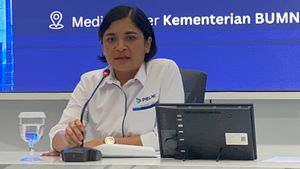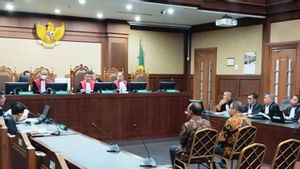JAKARTA - The Indonesian Employers' Association (Apindo) advises the government to create other growth drivers outside the State Revenue and Expenditure Budget (APBN), including investment and exports that are able to encourage short-term revenues in boosting economic growth to reach eight percent next year.
Chairman of Apindo Shinta W Kamdani said that considering the structure of the 2025 State Budget, he was more focused on increasing long-term productivity growth.
"Apindo also encourages the government to accelerate the realization of spending from the APBN and APBD because these two instruments can become an enabler for the national economy," Shinta told reporters, Thursday, December 19.
In seeing the opportunities and challenges in 2025, said Shinta, Apindo gave a note for Indonesia to further optimize trade growth in the Asian region, which is still the main contributor to global trade growth.
Selain itu, Shinta juga mengingatkan adanya tren China De-Risking yang membuka peluang strategis bagi Indonesia dalam menarik investasi serta memperluas ekspor sebagai alternatif dalam Global Value Chain (GVC).
On the fiscal policy side, Shinta assessed that the government needs to continue its fiscal consolidation policy by maintaining a deficit of 3 percent of GDP.
"The fiscal deficit taken by the government is 2.53 percent of GDP, but in order to maintain a sustainable fiscal policy," he said.
In addition, Shinta assessed that the APBN deficit needed to be maintained at 1.5 percent to 1.8 percent by innovating financing through the Government Business Entity Cooperation (PPP) scheme, Non-Aggaran Investment Financing (PINA), and Land Value Capture (LVC).
According to Shinta, the government also needs to explore sources of tax revenue to increase Indonesia's tax ratio by working on an underground economy, strengthening the core tax system policy, performing tax amnesty, implementing Non-Filling Systems (NFS) and institutional reforms.
Shinta added that currently, Indonesia is experiencing significant challenges in increasing people's purchasing power ahead of 2025 due to successive deflations from May to September 2024.
According to Shinta, the increase in the number of middle class population has increased, from 57.33 million people in 2019 to 47.85 million people in 2024, where the Indonesian middle class played an important role in boosting national consumption.
"This will be exacerbated by the plan to increase Value Added Tax (VAT) to 12 percent as of January 1, 2025," he explained.
SEE ALSO:
On the other hand, Shinta conveyed that the inconsistency of employment policies is also considered to have the potential to threaten investment and employment stability in Indonesia.
"With the change of employment regulations and less transparent wage policies such as the determination of the 2025 Provincial Minimum Wage (UMP) which was increased by 6.5 percent without the basic clarity of the calculation," he explained.
The English, Chinese, Japanese, Arabic, and French versions are automatically generated by the AI. So there may still be inaccuracies in translating, please always see Indonesian as our main language. (system supported by DigitalSiber.id)
















